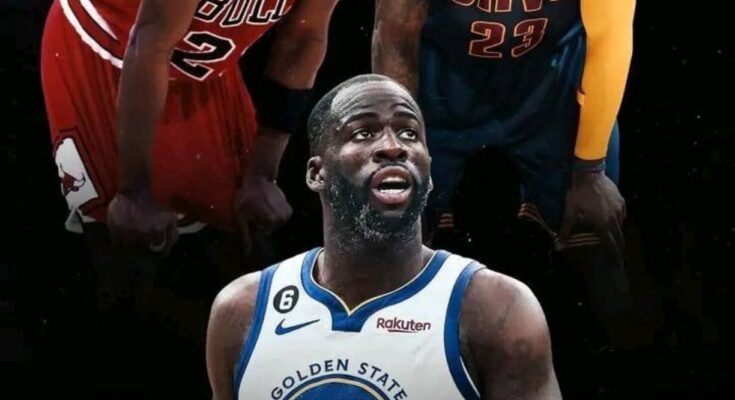Draymond Green has never been one to shy away from bold statements, and his latest take has once again reignited the eternal debate between Michael Jordan and LeBron James. In a recent discussion, Green declared that while Jordan is undoubtedly one of the greatest players of all time, he never actually beat the greatest team in NBA history. By contrast, Green argued, LeBron James did precisely that when he led the Cleveland Cavaliers to a miraculous comeback in the 2016 NBA Finals against the 73-win Golden State Warriors, a team Green himself was part of. This claim is not just another soundbite from the outspoken Warriors star—it cuts to the heart of one of basketball’s most enduring arguments: who really is the greatest player of all time?
To understand Draymond’s perspective, one has to revisit the historical context of both Jordan’s and LeBron’s career-defining victories. Michael Jordan’s Chicago Bulls, under Phil Jackson’s leadership, dominated the 1990s, winning six championships in two separate three-peats. Jordan’s Finals opponents included strong teams such as the Los Angeles Lakers led by Magic Johnson, the Portland Trail Blazers with Clyde Drexler, Charles Barkley’s Phoenix Suns, Gary Payton’s Seattle SuperSonics, and the Utah Jazz with Karl Malone and John Stockton. Each of those squads was formidable in its own right, stacked with Hall of Fame talent, but none of them has ever been described as the “greatest team ever.” In fact, the consensus has always been that Jordan’s Bulls were the ones holding that title, particularly the 1995–96 Chicago Bulls, who went 72–10 in the regular season before winning the championship. They were, by many accounts, untouchable.
LeBron James, on the other hand, has faced a different type of opposition in the Finals. His runs have often come against dynasties that were considered all-time great squads in their own right. The San Antonio Spurs with Tim Duncan, Tony Parker, and Manu Ginóbili were a model of sustained excellence. Then came the Warriors dynasty, spearheaded by Stephen Curry, Klay Thompson, and Draymond Green, who changed the very geometry of basketball with their three-point shooting and ball movement. But the crowning jewel of LeBron’s career, and the centerpiece of Green’s argument, is the 2016 Finals. That year, the Warriors entered the postseason after finishing with a 73–9 record, surpassing Jordan’s 72–10 Bulls as the best regular-season team in history. They were defending champions, playing with unprecedented confidence, and Curry had just become the first unanimous MVP in NBA history. The stage was set for Golden State to cement itself as the greatest single-season team ever. But LeBron had other plans.
The Cavaliers fell into a 3–1 hole in the series, a deficit no team in NBA Finals history had ever overcome. Yet LeBron, with Kyrie Irving at his side, delivered one of the most spectacular stretches of basketball ever witnessed. He scored 41 points in back-to-back elimination games in Games 5 and 6, then completed the miracle with an iconic Game 7 performance capped by “The Block”—his chase-down rejection of Andre Iguodala in the final minutes, one of the most legendary defensive plays in NBA history. Irving sealed the deal with a clutch three over Curry, and the Cavaliers became the first team ever to overcome a 3–1 deficit in the Finals. More than just a championship, it was a cultural moment: Cleveland’s first title in over 50 years, LeBron’s greatest triumph, and the undoing of a team that many thought could never be toppled. This, according to Green, is the trump card in LeBron’s favor.
Draymond’s argument is provocative because it reframes the GOAT debate through the lens of opposition. Jordan was unquestionably dominant, but his Finals opponents, while great, were never described as historically unbeatable. He beat Hall of Famers, yes, but not a team widely acknowledged as transcendent. In fact, the Bulls themselves were the transcendent squad of that era. Jordan was the bar, not the one leaping over it. LeBron, conversely, faced what was widely seen as an insurmountable task and did what had never been done before. To beat a 73-win team that had every conceivable advantage in terms of momentum, talent, and history is something that no other superstar can claim.
Critics of Green’s take will quickly point out that the 2016 Warriors had complications. Draymond himself was suspended for Game 5 after accumulating too many flagrant foul points, which many believe shifted the series’ momentum. Andrew Bogut was injured. Curry was hobbled with knee issues after his MCL sprain earlier in the playoffs. Detractors argue that the Warriors were not at full strength, which opens the door to questioning just how great the Cavaliers’ comeback truly was. But even with those caveats, Golden State still had enough firepower to close the deal, and no one before LeBron had ever overcome that type of situation against that type of juggernaut.
Green’s perspective also highlights a fascinating philosophical divide in how greatness is measured. Jordan’s perfection in the Finals—6–0 with six Finals MVPs—is often cited as the ultimate standard. He never let a Finals series slip away, never showed vulnerability when it mattered most, and his dominance was absolute. But LeBron’s case is built on resilience, longevity, and overcoming seemingly impossible obstacles. While his Finals record of 4–6 has often been used against him, the counter-argument is that he has consistently carried teams into the championship round, often against superior opponents. And when given the chance against the most dominant team ever assembled, he triumphed.
From Draymond’s vantage point as a player, the 2016 Warriors were the epitome of greatness. He lived through that season, felt the pressure of going 73–9, and experienced the heartbreak of losing when everyone believed they were untouchable. For him to acknowledge that LeBron James beat the greatest team is a testament not only to LeBron’s brilliance but also to the significance of that Finals. Green is essentially saying: if greatness is measured by the caliber of opposition you’ve conquered, then LeBron has the edge over Jordan.
Of course, Jordan’s defenders have their own counterpunch. They argue that it’s not Jordan’s fault his Finals opponents weren’t perceived as all-time great teams. The Eastern Conference during his era was brutal, filled with battles against the Detroit Pistons’ “Bad Boys,” the Patrick Ewing-led New York Knicks, and Reggie Miller’s Indiana Pacers. Jordan faced his toughest challenges before the Finals, and once he got there, he simply dominated. That consistency and ruthless ability to close the deal every single time is why so many still regard him as the unquestioned GOAT.
The debate then becomes not about talent or dominance but about narrative. Jordan’s story is one of flawless execution: every Finals appearance ended in a trophy. LeBron’s story is one of struggle and triumph against insurmountable odds, highlighted by the single greatest Finals victory in modern history. Both paths are legendary, but Draymond Green’s take leans heavily into the idea that the apex of LeBron’s career—the 2016 Finals—surpasses anything Jordan had to overcome.
It’s also worth noting that after 2016, the Warriors responded by recruiting Kevin Durant, an all-time great in his own right, to make sure they would never again be vulnerable in the same way. That move itself validates LeBron’s achievement. Golden State recognized that their 73-win formula wasn’t enough to withstand LeBron’s greatness, so they recalibrated by adding even more star power. That tells you how deeply that loss stung and how monumental LeBron’s victory truly was.
When Green says Jordan never beat the greatest team, he’s essentially reminding fans that context matters. Dominance against great competition is one thing; overcoming what was considered unbeatable is another. In 1996, Jordan’s Bulls were the unbeatable team. In 2016, LeBron slayed the unbeatable team. That is the distinction Green is making, and it’s one that will continue to fuel the GOAT debate for generations.
In the end, there may never be a definitive answer to who is the greatest. Jordan revolutionized the game, defined an era, and retired with a perfect Finals record that may never be matched. LeBron, meanwhile, has set records for longevity, versatility, and sustained excellence while also delivering one of the single most remarkable triumphs in NBA history. Draymond Green, as a competitor who stood directly in LeBron’s path, has provided a unique insider’s perspective on why the 2016 Finals might tip the scale in LeBron’s favor. His statement isn’t just a hot take—it’s a reflection of lived experience against an opponent who rose to an impossible occasion and etched his name into history.
And so the debate continues, fueled by moments, narratives, and opinions like Draymond’s. What is clear, though, is that LeBron’s victory over the 2016 Warriors was not just another championship. It was an achievement that altered legacies, shifted the course of basketball history, and ensured that, for as long as the GOAT debate rages on, LeBron James will always have an argument that cannot be dismissed. Whether or not one believes it makes him greater than Jordan is subjective, but as Green insists, Jordan never beat the greatest team ever assembled—LeBron did. And that is a fact that cannot be erased.



